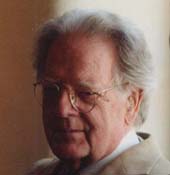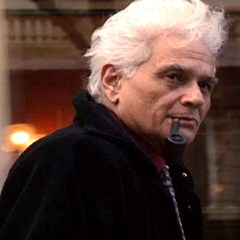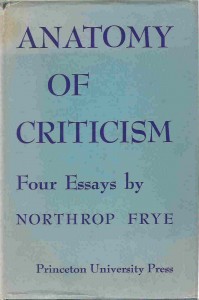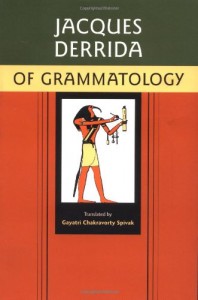As Bob Denham pointed out in his post the other day, Frye is sceptical of and occasionally hostile to post-structuralism generally and to Derrida specifically in the notebooks, but is more conciliatory in his published work and, as we saw yesterday, in interviews. He even suggests the possibility of consensus from time to time. In the introduction to Words with Power he observes that despite the variety of critical schools on the scene there is nevertheless “an underlying consensus of attitude” that could still “progress toward some unified comprehension” of literature (xviii). What this underlying consensus of attitude might be is not entirely clear from anything Frye has to say about the matter, and it is of course easier to think of him and Derrida — who is obviously much on Frye’s mind in Words with Power — as irreconcilable. The critical vocabulary each uses only heightens the sense of opposition: Frye considers metaphor a statement of identity, Derrida a relation of differences; Frye emphasizes presence, Derrida absence; and where Frye sees language leading to kerygma, or “proclamation,” Derrida sees aporia, or “impassable path.”
Frye and Derrida do, however, have at least one very important thing in common: both reveal the radically metaphorical condition of language. Frye identifies metaphor and myth as two aspects of the same elementary phenomenon, myth being metaphor as narrative (mythos), and metaphor being myth as a pattern of verbal elements (dianoia). In The Great Code he says that myth is “implicit metaphor” because it is made up of the juxtaposition of metaphors (59). Derrida, for his part, in “White Mythology” observes that the “whole philosophical delimitation of metaphor is already constructed and worked upon by ‘metaphors’ … All the concepts which have played a part in the delimitation of metaphor always have an origin and a force which are themselves ‘metaphorical.'” (New Literary History 6, 174)
Why is it then that Derrida’s readings move in the direction of aporia and Frye’s in the direction of kerygma? The main reason seems to be that Derrida, as suggested by the quote above, is a philosopher offering a critique on the “transcendental signifieds” of the “metaphysics of presence” that make up the assertions of truth which dominate the Western philosophical tradition. Frye, by contrast, is a literary scholar whose critical principles arise from the inductive survey of literature as an imaginative verbal structure existing for its own sake. The issue for Frye is not so much an obscure metaphysics of presence as it is the conspicuous presence of metaphor. Where Derrida sees language reaching for an illusory transcendental signified, Frye perceives the principle of immanent signification which expresses archetypal human concerns whose “reality” is that they are recognizably human. This distinction between a philosophical and a literary conception of language may provide a useful perspective on the direction literary criticism has taken since Derrida’s appearance on the North American scene in the late 1960s. Relentlessly changing critical fashion has apparently consigned both Frye and Derrida to the sidelines for the time being, but these two figures nevertheless represent a great divide in literary criticism that was fully apparent about twenty-five years ago and left critical theory and practice the poorer for it.
Deconstruction may have been superseded as a go-to critical tool, but its legacy endures in the Derridian notions of absence, difference, marginality, privileging and totalization, which are hallmarks of the criticisms of gender, class, race and culture that steadily rose to prominence during the 1990s. The result is that we’ve effectively returned to the state of affairs Frye complained about more than fifty years ago in the Polemical Introduction of Anatomy of Criticism: we are surrounded on all sides by what claims to be literary criticism but which nevertheless regards literature as an allegorical expression of ideological conceptions outside of it. Literary Darwinism, anyone? This situation is especially puzzling because we might have expected that Derrida’s influence would only encourage the continued deconstruction of ideology-based criticism. But criticism, like nature, abhors a vacuum, and (about as reliably as Frye predicted) deconstruction quickly exhausted its potential and we are once again scrambling to figure out just what literature is really “about.”



